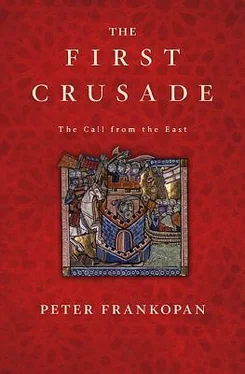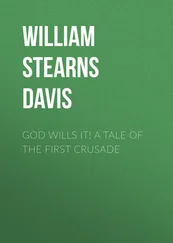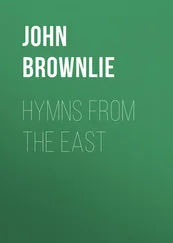The Pope immediately recognised the opening. He had already been intending to visit France in order to take advantage of the sharp improvement in his position. He reacted quickly and decisively to the appeals from the emperor’s envoys at Piacenza: ‘Our Lord Pope called on many to perform this service, to promise by oaths to betake themselves [to Jerusalem] by God’s will and to bring the emperor the most faithful assistance against the heathen to the limits of their ability.’ 70Rather than sending out letters that talked about the principles of an expedition without providing detail, structure or purpose, Urban decided to devise and put in place personally an expedition to transform the eastern Mediterranean. He was single-minded in his purpose. As one chronicler reported, ‘when he heard that the interior part of Romania had been occupied by the Turks and the Christians subdued by a ferociously destructive invasion, Urban, greatly moved by compassionate piety and by the prompting of God’s love, crossed the mountains and descended into Gaul and caused a council to be assembled in Auvergne at Clermont’. 71
This was to be the moment at which the Pope’s grand scheme would be announced. Much now depended on the pontiff’s stamina and his ability to engage with leaders and communities across France to mobilise a force to come to the help of Byzantium.
7
The Response of the West
The Crusade drew on passion, religious fervour and a desire for adventure. Many of its participants were certainly intoxicated by Urban’s compelling insistence on Christian duty and the promise of salvation, and the speed and enthusiasm with which the Crusade began can easily be read as the surging of a great, spontaneous uprising. But the Crusade was also elaborately orchestrated: the rhetoric used to rouse the west was carefully weighted to attract the right kind of Crusader – whether in terms of military or social clout – and arrangements were made, as far as possible, to regulate and provision the stream of fighters who made their way towards the Holy Land. To understand the spectacular unleashing of Christian forces, therefore, the risky calculations behind it need to be appreciated. Urban’s words were carefully chosen to speak to his western audience but his appeal was shaped by an agenda that was to a large extent set by Alexios in Constantinople. Urban was walking a difficult path: rousing mass enthusiasm to raise an efficient, controllable military force that could meet very particular Byzantine military objectives. The mobilisation of the west is a story of extraordinary political and logistical intricacy – it was a balancing act of such complexity that it was, ultimately, impossible to control.
Urban arrived in southern France in July 1095, and spent the next months laying the groundwork for the expedition. As he moved around the country meeting influential figures, the Pope articulated his aims forcefully and repeatedly: to drive back the Turks and, in doing so, to liberate both the Christian population in the east and the city of Jerusalem. But there was very limited discussion of the expedition’s structure, its objectives, or its organisation – let alone what the ‘liberation’ of the east actually meant in practical terms. 1
In some ways, the fact that Urban’s appeals before, at and after the Council of Clermont were so vague goes some way to explaining the strength of the response. Joining the armed pilgrimage to Jerusalem was presented as an issue of faith rather than a blueprint for a military campaign. The knights who flocked to take part were driven by an enthusiasm to do God’s work or, in many cases, to repent for their sins. But there was also a strong political reason why the logistics were put to one side: these were to be dealt with by the emperor in Constantinople. Alexios had called for military muscle to help against the Turks, and he, surely, would be responsible for planning the expedition and taking care of the practicalities.
Energised by his dramatic change in fortunes in Italy, Urban set out to identify and recruit leading figures whose participation would encourage others to take part. Over the course of the summer of 1095, he travelled to meet them individually. He went to see Adhemar of Monteil, the influential and well-connected bishop of Le Puy, who jumped at the chance of making the journey to Jerusalem. Urban also met Eudes of Burgundy and the powerful Hugh, archbishop of Lyons, during a punishing itinerary through southern France, where he visited Valence, Le Puy, Saint-Gilles and Nîmes in quick succession before moving north. 2
Urban then made contact with Raymond, Count of Toulouse, who controlled a vast sweep of land stretching across southern France and Provence. He came from a family well disposed to the papacy, but also with a strong connection to Jerusalem. Raymond’s elder brother, William, had made a pilgrimage to Jerusalem and died there in the early 1090s, either unable to get home or having decided to live his last days in the Holy City. 3No less devout, Raymond funded a cohort of priests to perform a Mass and say prayers for him every day, and he ensured that a candle was kept lit by the statue of the Virgin Mary in the church of Le Puy as long as he was alive. 4Raymond was one of the first figures Gregory VII had turned to for help after the Council of Brixen in 1080, when the election of an antipope threatened to split the church. 5
Urban knew that Raymond’s involvement was vital. His participation would show that the campaign had the backing of a major sponsor; which could then be used to spur other leading magnates into taking part in the expedition. It was a tactic that had much in common with Alexios’ rationale for communicating with Robert of Flanders, hoping that Robert’s example would inspire others to provide help. The Count of Toulouse’s positive response to Urban was, therefore, a significant boost. And it was reassuring for another reason: the more alliances Urban could build that bolstered his image as the protector of the faithful, the stronger it made his position as leader of the church as a whole.
In the middle of October 1095, the Pope reached the mighty abbey of Cluny, where he had once been prior, pausing for a week and consecrating the high altar of the huge new abbey church that was under construction. 6By this time, word had already spread and excitement about the expedition to Jerusalem was building. 7It was here that the Pope announced that he had an important message to deliver to the faithful at the Council of Clermont. He encouraged participants such as the bishop of Cambrai and the archbishop of Rheims to bring with them ‘all the most eminent men, the more powerful princes’ from their dioceses. 8
The Council of Clermont took place in November 1095, and concluded with Urban’s speech which painted a terrifying picture of the situation in Asia Minor. Terrifying though the report given by the Pope was, it was also painfully accurate, as his listeners would have been aware from other news they had received from the east. The Greek Empire had been dismembered, the Pope correctly reported; the Turks had conquered a swathe of territory so vast that it took fully two months to cross. Urban begged his listeners to act: ‘So let all feuds between you cease, quarrels fall silent, battles end and the conflicts of all disagreements fall to rest. Set out on the road to the Holy Sepulchre and deliver that land from a wicked race.’ 9Those who were willing to do so were enjoined to weave an image of the Cross, in silk, gold or more simple material, into their clothes, to show that they were God’s soldiers, doing His will. 10
As soon as the Pope had finished, the bishop of Le Puy, ‘a man of the highest nobility, went up to [Urban] with a smiling face and on bended knee, begged and beseeched his permission and blessing to make the journey’. 11Le Puy’s importance was underlined when the Pope wrote to the faithful of Flanders not long after that he had ‘appointed in [his] place as leader of the journey and labour, our dearest son, Adhemar, bishop of Le Puy’. 12The day after Urban’s speech, envoys arrived from the Count of Toulouse, declaring Raymond’s willingness to take part in the expedition. 13This high-profile support had all been carefully engineered in advance, to get the initiative off to a flying start.
Читать дальше











